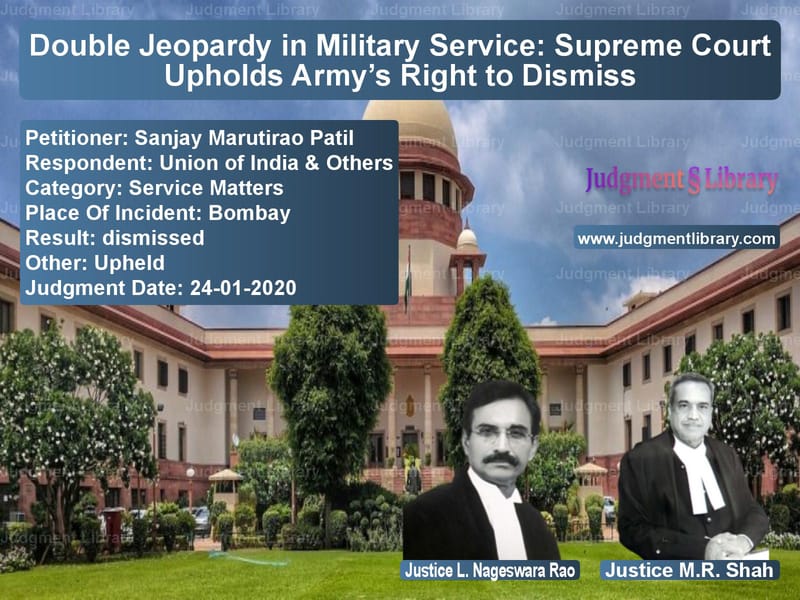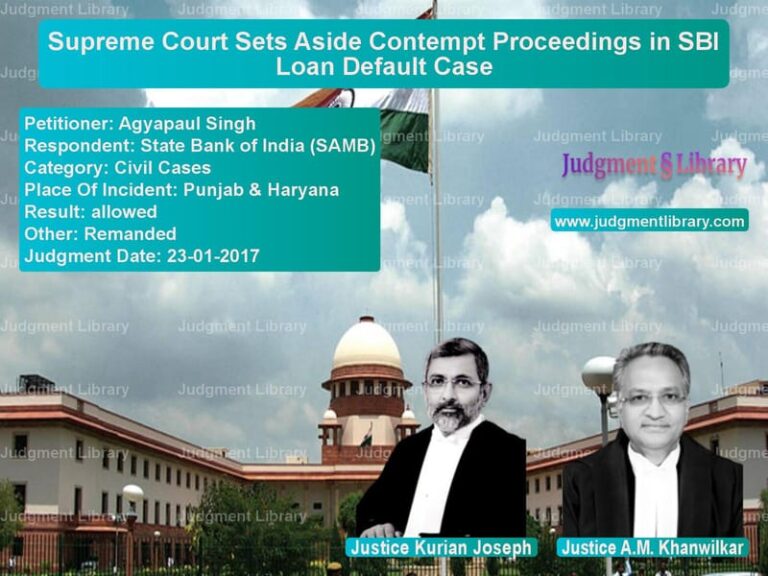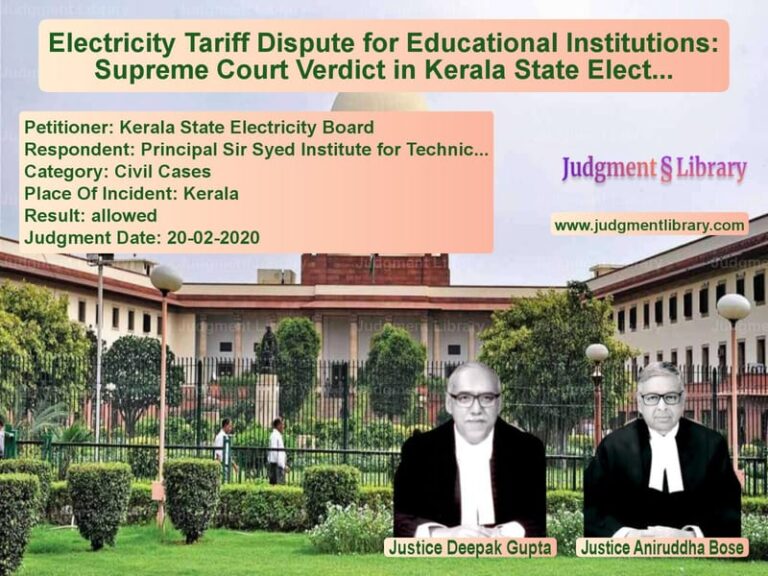Double Jeopardy in Military Service: Supreme Court Upholds Army’s Right to Dismiss
The case of Sanjay Marutirao Patil vs. Union of India & Others examines the dismissal of an Army personnel and whether it violated the principle of double jeopardy. The Supreme Court was asked to determine whether an army officer, who had already been punished through a Summary Court Martial, could be dismissed from service under administrative powers.
Background of the Case
The appellant, Sanjay Marutirao Patil, was a soldier in the Indian Army. He joined as a Sepoy in 1990 and was promoted to Naik in 1994-95. However, he was charged with three misconduct offenses under Section 63 of the Army Act, 1950. The charges included:
- Failing to correctly prepare certified receipt convoy notes.
- Not dispatching consignments on time.
- Providing false information about missing steel buckets.
He was tried by a Summary Court Martial and sentenced to reduction in rank on August 7, 1999. Later, he was issued a Show Cause Notice under Section 20 of the Army Act, questioning why he should not be dismissed from service. His response was found misleading, and after a Court of Inquiry, he was dismissed on April 29, 2002.
Legal Issues and Proceedings
The primary legal issues in the case were:
- Whether a soldier who had already been punished by a Summary Court Martial could be dismissed under Section 20 of the Army Act.
- Whether this dismissal violated double jeopardy under Article 20(2) of the Indian Constitution.
- Whether the dismissal order complied with procedural requirements under Rule 17 of the Army Rules.
Arguments of the Appellant (Sanjay Marutirao Patil)
The appellant raised the following points:
- He had already been punished by the Summary Court Martial, and further dismissal would amount to double jeopardy.
- His dismissal was an arbitrary exercise of power under Section 20 of the Army Act.
- The Show Cause Notice did not clearly state the allegations of fraud or provide adequate time for his defense.
- The second Show Cause Notice did not constitute fresh charges but was merely an extension of the earlier allegations.
Arguments of the Respondent (Union of India)
The government countered the appellant’s claims with the following arguments:
- Administrative dismissal is separate from disciplinary punishment. Section 20 of the Army Act grants the Army Chief the authority to dismiss a soldier in the interest of service.
- The appellant’s conduct was found to be fraudulent in nature, which was a separate reason for dismissal.
- The Court of Inquiry confirmed that the appellant provided false information, justifying his dismissal under Rule 17 of the Army Rules.
- The dismissal did not amount to double jeopardy because it was an administrative decision rather than a criminal conviction.
Key Observations of the Supreme Court
The Supreme Court analyzed the case based on:
- The independent authority of the Army Chief under Section 20 of the Army Act.
- The procedural compliance under Rule 17 of the Army Rules.
- The interpretation of double jeopardy in military service.
After reviewing the case, the Court made the following findings:
- The Summary Court Martial only imposed a rank reduction, which was not a final verdict on the officer’s retention in service.
- The Chief of the Army Staff had an independent right to dismiss an officer if it was in the best interest of service.
- The second Show Cause Notice was not for the same offense but for subsequent misconduct involving false information.
- The appellant was given adequate opportunity to respond to the allegations before his dismissal.
Verbatim Court Findings
The Supreme Court, upholding the dismissal, stated:
“The administrative power under Section 20 of the Army Act is independent of the Summary Court Martial’s proceedings. The appellant’s misconduct went beyond the initial charges and warranted dismissal.”
Additionally, the Court clarified:
“Double jeopardy under Article 20(2) applies to criminal prosecution, whereas the present case involves administrative action for service misconduct. Hence, the dismissal does not violate constitutional safeguards.”
Final Judgment
The Supreme Court ruled in favor of the respondents:
- The appellant’s dismissal was upheld as lawful under Section 20 of the Army Act.
- The plea of double jeopardy was rejected as it did not apply to administrative proceedings.
- The High Court’s decision to dismiss the appellant’s writ petition was affirmed.
Final Verdict: Appeal dismissed, Army’s dismissal order upheld.
Petitioner Name: Sanjay Marutirao Patil.Respondent Name: Union of India & Others.Judgment By: Justice L. Nageswara Rao, Justice M.R. Shah.Place Of Incident: Bombay.Judgment Date: 24-01-2020.
Don’t miss out on the full details! Download the complete judgment in PDF format below and gain valuable insights instantly!
Download Judgment: Sanjay Marutirao Pat vs Union of India & Oth Supreme Court of India Judgment Dated 24-01-2020.pdf
Direct Downlaod Judgment: Direct downlaod this Judgment
See all petitions in Disciplinary Proceedings
See all petitions in Public Sector Employees
See all petitions in Termination Cases
See all petitions in Judgment by L. Nageswara Rao
See all petitions in Judgment by Mukeshkumar Rasikbhai Shah
See all petitions in dismissed
See all petitions in Upheld
See all petitions in supreme court of India judgments January 2020
See all petitions in 2020 judgments
See all posts in Service Matters Category
See all allowed petitions in Service Matters Category
See all Dismissed petitions in Service Matters Category
See all partially allowed petitions in Service Matters Category







